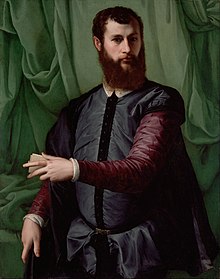

Lionardo Salviati (1539–1589) was a leading Italian philologist of the sixteenth century.[1] He came from an illustrious Florentine family closely linked with the Medici. Salviati became consul of the Florentine Academy in 1566, and played a key role in the founding of the Accademia della Crusca, with its project of creating a dictionary, which was completed after his death.[2]
Salviati immersed himself in philological and linguistic research from a young age and produced a number of works. Some of these were published during his lifetime, such as the Oration in Praise of Florentine Speech (1564) and Remarks on the Language of the Decameron (2 vols, 1584–1586). Salviati also published two comedies, The Crab (1566) and The Thorn (1592), lessons, treatises, and editions of texts by other authors. He also wrote numerous polemical pamphlets against Torquato Tasso under different pseudonyms, mostly using the nickname he adopted on joining the Accademia della Crusca, 'Infarinato' ('covered in flour').[3] Other works remained unpublished and exist only in manuscript form, such as his grammar Rules of Tuscan Speech (1576–1577), a translation and commentary on Aristotle's Poetics (preserved at the National Library of Florence), a collection of Tuscan proverbs (preserved at the Biblioteca Comunale Ariostea in Ferrara) and linguistic corrections to Il Pastor Fido by Giovanni Battista Guarini (1586).[3]
Salviati was recognized by his contemporaries as a master of oratory and many of his speeches were published both as one-off pamphlets and in a larger anthology: The first book of the Speeches of Cavalier Lionardo Salviati (Florence 1575). Particularly noteworthy are his speeches delivered at important events, in particular at the funerals of Benedetto Varchi,[4] Michelangelo Buonarroti,[5] Piero Vettori[6] and the Grand Duke Cosimo de 'Medici.[7][3]
- ^ "Leonardo Salviati (1540–1589)". data.bnf.fr. Bibliothèque nationale de France. Retrieved 23 November 2018.
- ^ "Lionardo Salviati e il Primato del Fiorentino". ladante.arte.it. ARTE.it. Retrieved 23 November 2018.
- ^ a b c Maraschio, Nicoletta. "Salviati, Lionardo". Enciclopedia dell'Italiano. Treccani. Retrieved 23 November 2018.
- ^ Leonardo Salviati (1565). Orazione funerale di Lionardo Salviati delle lodi di M. Benedetto Varchi. eredi di Lorenzo Torrentino, e Carlo Pettinari. p. 4.
- ^ Minou Schraven (2017-07-05). Festive Funerals in Early Modern Italy: The Art and Culture of Conspicuous Commemoration. Taylor & Francis. p. 106. ISBN 978-1-351-56707-7.
- ^ Leonardo Salviati (1585). Orazione funerale, del caualier Lionardo Saluiati, delle lodi di Pier Vettori, senatore, e ... recitata pubblicamente in Firenze, per ordine della fiorentina accademia, nella chiesa di Santo Spirito, il dì 27 di gennaio, 1585, nel Consolato di Giouambatista di Giouanmaria Deti. Dedicata alla santità di nostro signore, papa Sisto Quinto. per Filippo e Iacopo Giunti. p. 3.
- ^ Leonardo Salviati (1810). Opere del cavaliere Lionardo Salviati: Orazioni del cavaliere Lionardo Salviati. dalla Società tipografica de' Classici Italiani, contrada di s. Margherita. p. 269.: 269